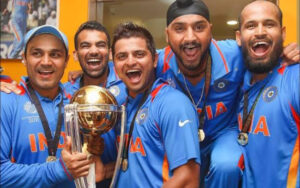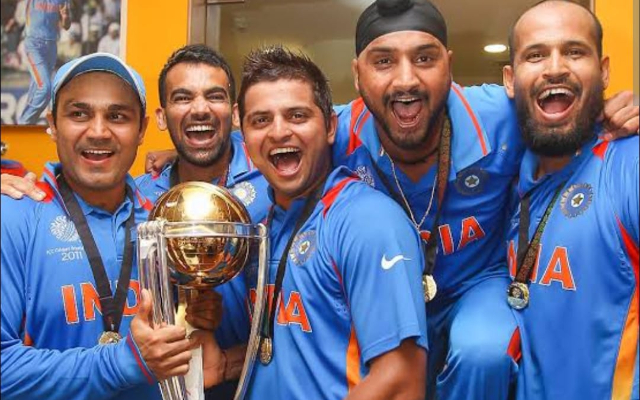
We have celebrated MS Dhoni for the 2011 World Cup win and rightly so. He steered the ship and the buck, so to say, stopped with him. But the one person who was pivotal in winning India two key games, the quarterfinal against Australia and semi-final against Pakistan, also decided to leave the international stage on the same day, 15 August 2020. A white-ball champion, Suresh Raina’s contribution to the 2011 World Cup win was less than anyone else’s. And on the day he turns 37, we look back at that tournament which stands out as the highlight of an excellent white-ball career.
Raina, 25 at the time, was not in the team for the initial games and in his words, ‘was doing everything I can to attract attention that I was the best option at number six. I would spend maximum time doing fielding practice and was determined to make a case to Gary and Dhoni for my inclusion. Playing the World Cup at home was a dream and playing Australia and Pakistan were two of the biggest occasions for any player playing the sport.’
He did get an opportunity in India’s last group encounter against the West Indies in Chennai but that was because Sehwag was sitting out with an injury. With Sehwag back in the playing XI against Australia, it was a toss-up between Raina and Yusuf Pathan. And this is where one has to give Dhoni his due. While it is all well to say Dhoni was India’s best white-ball captain ever, there were occasions when his captaincy cameunder scrutiny. This was one such. Should it be Raina or Pathan? It was one decision that could have impacted India’s progress in the World Cup and Dhoni had to get it right. And he did.
Raina, sitting next to Tendulkar in the dressing room, must have had a thousand ideas flooding his mind when Tendulkar said to him, ‘Look at this as an opportunity. A World Cup quarter-final with 78 runs left and you have a chance to win it for the country. It is your day, go win it for India.’ Raina, a Tendulkar fan since childhood, was lost for a second or two. ‘It was Sachin paaji who was speaking to me,’ recounted Raina. ‘He had waited for six World Cups to win the trophy. And here he was urging me to do it for him and India. With Dhoni out and 75 runs still to get, I could not have asked for a better opportunity to make a mark.
‘All I told him was, “Paaji, aaj jita ke aayeenge [Will win it for India tonight, elder brother].’
To keep him company in the middle, he had a well-set Yuvraj Singh. Raina made an unbeaten 28-ball 34 on the night, as Australia were beaten in a knockout game for the first time since 1996. Those weren’t many runs when you consider the asking rate towards the close of the innings. But that near-one-hour stint he pulled off in the middle, batting with Yuvraj, was perhaps the most invigorating hour for each of us in the stands. Starting with three dot balls, he soon asserted himself with a pull shot off Brett Lee, and followed it up with regular singles and another four and a six to seal it for India.
‘I remember telling Yuvi paaji, “Mujhe mera natural game khelne do. Aaj hum log jeet ke hi jayenge [You must let me stick to my natural style. We will be the victors tonight].”’
How does a 25-year-old react to shouldering a billion dreams? Did Raina think of the crowd when he was batting out there for himself and India? Did it matter that one false shot could lead to bowing out of the World Cup at home, and missing out on an opportunity to play Pakistan in a historic semi-final?
‘All Yuvi paaji and I were seeing was Brett Lee, Mitchell Johnson and the others,’ said Raina. ‘To tell you the truth, even when I hit those boundaries or sixes, I did not feel any sense of elation. The job was still not finished. All I was thinking was, I had got this opportunity after a lot of effort and I couldn’t let it go.’
Innocent words from a 25 year old, but in doing what he did, he elevated Indian cricket to a very different pedestal. Making sure that Australia, world champions for 12 years, were soon going to be that in the past tense. With each run scored, cricket was consolidating itself as India’s most reliable blue-chip investment, which had no parallel in the country’s sports universe. And Raina, thanks to his priceless 34, was now a certainty at No. 6 for the rest of the tournament—the semi-final and final.
‘Wahab [Riaz] was bowling really well in the semi-final and getting the ball to reverse,’ said Raina. ‘At 205-6 in 42 overs, and with Dhoni out, we weren’t safe. I walked up to Bhajji pa, who came to the crease and told him we needed to get 60 runs more to make it our game. We had to forge a partnership and there was no need to try and hurry things up.’ Did he not panic seeing Tendulkar and Dhoni get out before him? It was India playing Pakistan, a match that India just couldn’t afford to lose! Did that not play on his mind as he was giving sane advice to the older and more experienced Harbhajan Singh? What is it with high-performance sportsmen at that level that they can keep poise in the face of humongous pressure?
It is time to pause for a moment and dwell on a hypothesis. If Pakistan had indeed won that Mohali clash, they would have played the final in Mumbai, a bastion of the Hindu right. And here was a possibility of Pakistan playing in Mumbai after having beaten India in a World Cup semi-final. Talk of rubbing it in. Chasing 261, Pakistan did have a chance but as has often been the case with the side in recent times, they disintegrated after a reasonably good start. Did Raina ever think of the possibility of Pakistan playing in Mumbai in the final? Did Tendulkar, himself a Mumbaikar to the core, ever contemplate this?
Alternate history always throws up countless possibilities but the good thing is that the real world never has to deal with them. The real world was all about India. About Gautam Gambhir saying that he dedicated the win to the victims of the 26/11 terror attacks and about a billion people getting their best chance to accord a World Cup farewell to their biggest home-grown cricketing superhero. For Tendulkar, it was his last chance. It was now or never.
‘Right through the tournament, we used to listen to Sachin paaji,’ said Raina. There was something about him this tournament. First, he was playing some great cricket himself; he had scored two hundreds already. And when he said our fans wanted us to win, you could see a very different confidence in his eyes. He was calm but confident and each of us drew inspiration from him.’
Raina ended up getting 36 off 39 deliveries against Pakistan, but as Tendulkar would say later, ‘It was an innings as important as any in the context of the match. 260 was a competitive total and Raina had a major part to play in it.’
In the end, India won by 29 runs, just a few less than what Raina had scored. He had redeemed himself and, in doing so, ensured that Tendulkar had an opportunity to fulfil his lifelong dream—winning the World Cup for India in front of his home crowd.
It is fitting that we remember Raina’s telling contributions on his birthday, just a week after another World Cup dream was shattered – putting in context just how tough it is to win these tournaments.




